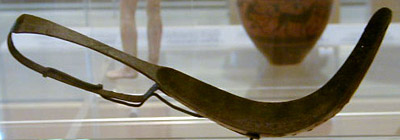
strigil

The Greeks, Etruscans, and Romans made use of this hollow curved instrument to cleanse oil, sometimes mixed with abrasives, and dirt from their perspired bodies. The strigil was used by athletes, both before and after exercise or contests (the Apoxymenos sculpture portrays an athlete scraping himself), and by bathers, whose perspiration arose from either a hot water bath or the atmosphere in a dry room intensely heated to bring about sweat.
Umbricius describes a scene of slaves preparing for a pre-dinner bath in a private home, in anticipation of their master's return from walking in the city. While strigils have been found of horn, bronze, iron, and silver, the verb sonat here has been understood to indicate strigils of metal.
Martial enjoins the use of the curvo ferro as a hedge against wearing out your towels at the cleaner (Ep. 14.51). Persius (Sat. 5.126) sees carrying the strigil to the baths as one of the compulsory duties of the young slave. Plautus includes the strigil (Persa 1.3.44 and Stichus 1.3.77: robiginosam strigilem) among the very few things that a parasite can call his own.